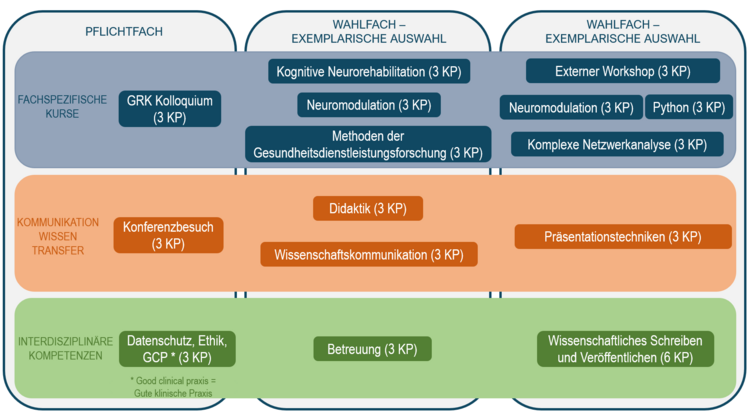Qualifikationsprogramm
Kontakt

Sprecherin des GRK
Wissenschaftliche Koordination
Sekretariat: Finanzen und Administration
Qualifikationsprogramm
Unsere Promovierenden profitieren davon, Teil der Oldenburger Graduiertenschule OLTECH (Graduate School Science, Medicine and Technology) zu sein. OLTECH bietet maßgeschneiderte Programme für Doktorand*innen, die fachspezifische Kurse, Kurse zu Kommunikation und Wissenstransfer sowie interdisziplinäre Kompetenzkurse umfassen.
Zur Vertiefung des Fachwissens werden Kursen angeboten zu bildgebenden Verfahren in der Medizin, zu Time Series Analysen, Analysen komplexer Netzwerke und Neuroimaging-Daten, zu Matlab- oder Python-Programmierung, sowie Seminare und Vorlesungen über Neuromodulation, Neurorehabilitation oder die Versorgungsforschung. Zu den Kursen, die auf die Verbesserung der Kommunikation und des Wissenstransfers abzielen, gehören zum Beispiel Kurse für fortgeschrittene Präsentationsfähigkeiten, Kurse zur Didaktik und zur Wissenschaftskommunikation oder Deutschkurse für Nicht-Muttersprachler*innen. Zu den Kursen, die auf die Förderung interdisziplinärer Kompetenzen abzielen, gehören Kurse zur Karriereentwicklung innerhalb und außerhalb der Wissenschaft, zum Projektmanagement sowie zu Datenschutz, Ethik und guter klinischer Praxis, um nur einige Beispiele zu nennen. Um das OLTECH-Curriculum zu absolvieren, müssen die Doktorand*innen insgesamt 30 Leistungspunkte (Creditpoints, CP) erwerben, davon mindestens 12 CP für Kurse zu fachspezifischen Fähigkeiten, sowie jeweils mindestens 6 CP für Kommunikation/Wissenstransfer und für überfachliche Kompetenzen. Wie dies aussehen könnte, zeigt die Abbildung.

Als Doktorand*in unseres GRK profitieren Sie auch von einer Reihe von Maßnahmen, die darauf abzielen, die Vernetzung, Internationalisierung und Mobilität zu Beginn Ihrer Karriere zu fördern. Doktorand*innen müssen einen mindestens vierwöchigen Besuch in einem anderen Labor, einem Rehabilitationszentrum oder einer anderen GRK-bezogenen Gesundheitseinrichtung absolvieren. Die Besuche werden durch die Bereitstellung von Reisestipendien unterstützt. Promovierende des GRK werden die Federführung bei der Organisation der jährlichen Sommerschule des GRK haben. Weiterhin gefördert wird die wissenschaftliche Vernetzung der Promovierenden durch eigens organisierte Einladungen von international renommierten Forscher*innen zu den Sommerschulen oder den häufigeren GRK-Forschungskolloquien und durch die Interaktion mit dem GRK-Beirat bestehend aus nationalen und internationalen Expert*innen der Neuromodulations- und Neurorehabilitationsforschung. Vernetzung, Internationalisierung und Mobilität werden darüber hinaus durch Mittel für die Teilnahme an nationalen und internationalen Konferenzen unterstützt. Internationale Doktorand*innen und Wissenschaftler*innen werden bei der Eingewöhnung durch das International Office der Universität Oldenburg unterstützt.
Das GRK hat zum Ziel, Doktorand*innen bei ihrer Karriereentwicklung und Berufswahl zu unterstützen. Neben den Angeboten der Graduiertenschule OLTECH, der Bereitstellung von Möglichkeiten zur Vernetzung und zum Sammeln von Arbeitserfahrungen in anderen Laboren oder im klinischen Bereich auf nationaler und internationaler Ebene, werden wir die Studierenden dabei unterstützen, erste Erfahrungen bei der Sicherung der eigenen Finanzierung und bei der Verfolgung von Forschungsideen zu sammeln, indem wir den Doktorand*innen die Möglichkeit geben, sich um kleine interne Forschungsgelder zu bewerben. Alle Doktorand*innen können sich aktiv an der forschungsbasierten Lehre beteiligen, beispielsweise durch die Betreuung von Laborprojekten oder Masterarbeiten.
